Chausa (UP-Bihar border): The lakhs of migrants leaving the cities in their desperate fight against the threat to life and livelihood posed by Covid-19 aren’t looking to return any time soon, ThePrint’s interactions with scores of labourers in Bihar and Uttar Pradesh suggest.
They cite a variety of reasons for their resolve not to return to cities: They are hurt by the fact that the cities “disowned” them, the “kharab vyavahar (bad treatment)”, a loss of “trust” in the government, and a hope to make ends meet in their home states.
The anger and hurt, however, is not a pain the migrants will bear alone. This resentment, experts say, could cost India dearly, even imperil the government’s efforts to restart economic activity.
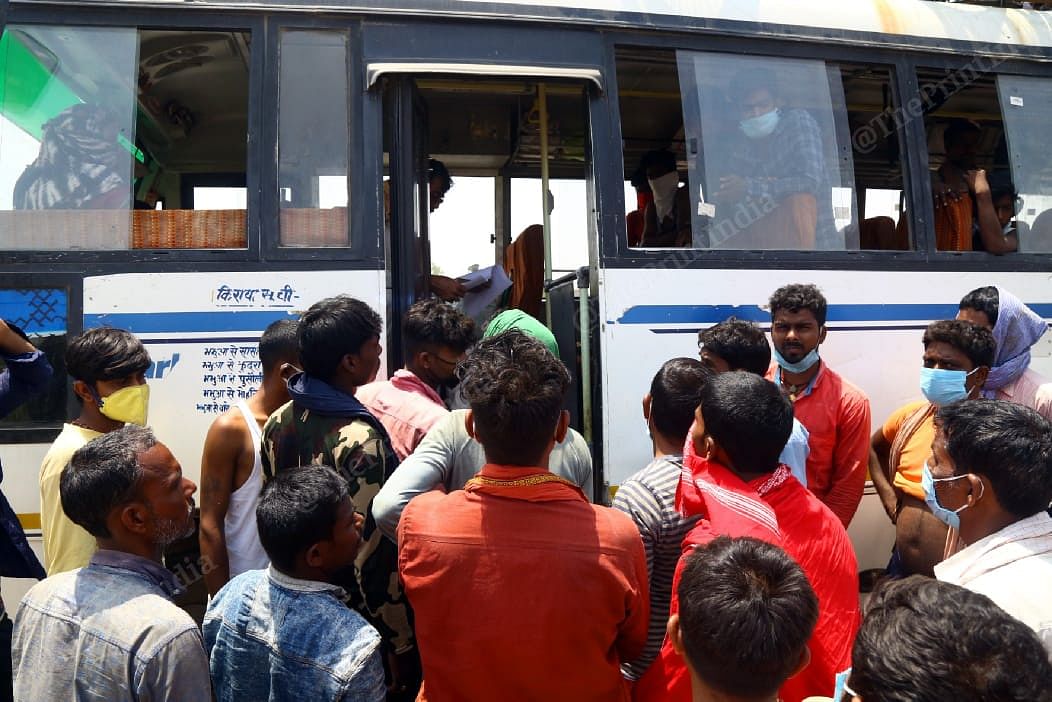
Also Read: MGNREGA, skill-based work — options states are weighing to help returning migrant workers
State of the migrants
Undeterred by heat and hunger, Kailash Yadav started cycling from Delhi for Bihar, a journey of nearly 1,000 km, on 29 April, two days before the central government allowed special trains to take migrants home.
Speaking to ThePrint at the UP-Bihar border, where he reached Sunday, Yadav said he didn’t want to die in a city that has “disowned me”. “If we have to die of hunger, better to die in our own villages than the cities that have shunned us,” he added.
Yadav had started out with 50 other men, but only eight completed the journey, after managing to duck police at multiple points.
“There were 50 of us but at many places the police stopped and beat us up. Finally, eight of us managed to escape through the farms,” he said.
All eight men rode with hunger as their constant companion. “I have been surviving on biscuits and water for the past five days as I cycled over 1,000 kilometres. We waited for a month thinking things would normalise but the situation only worsened so we decided to head home,” Yadav said, as he waited to board a bus to Bihar’s Samastipur.
Since 1 May, the state government, like others across India, has organised buses to ferry returning migrants from the border to their hometowns, as well as to take migrants within Bihar to borders with neighbouring states.
Upset over the treatment meted out to him, Yadav has vowed not to go back. “Ab Delhi kabhi nahi jayenge. Yahin kheti-baadi karenge, noon-namak khaenge (I will not go to Delhi again. Will pursue farming here, live on salt),” he said, getting his cycle stacked on the roof of the bus.
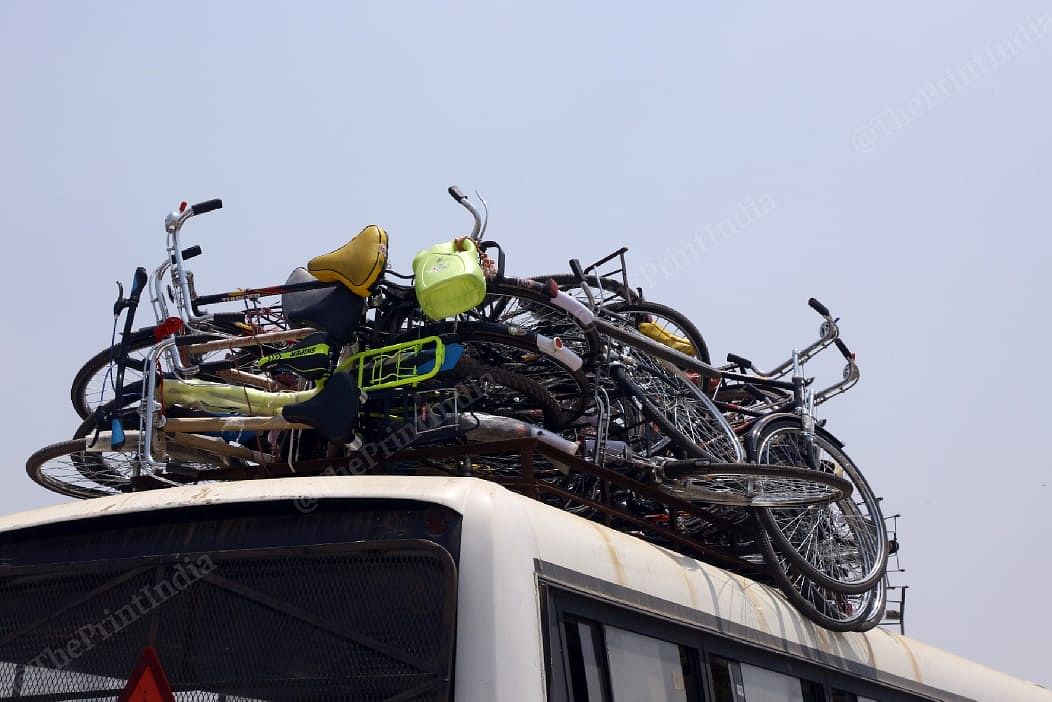
Yadav’s plight reflects the misery suffered by much of India’s migrant population over the past few weeks, despite repeated assurances from the government amid the world’s largest, and probably strictest, coronavirus lockdown.
While the Modi government and many states have announced measures to ensure the safe return of migrants home, the targeted beneficiaries complain the plans are moving along slowly, forcing them to head home on their own.
Migrants form the backbone of economic activity in urban centres across India, be it the labourers that power construction and factory work, or domestic helps.
The Economic Survey of 2017 pegs migration within India between 50 lakh and 90 lakh annually. More than half of these migrants, the survey states, belong to Uttar Pradesh and Bihar.
Although there is no official data on the exact number of migrants in India, estimates have been made for 2020 by Professor Amitabh Kundu of the Research and Information System for Developing Countries, a New Delhi-based research institute.
Derived with the help of the 2011 Census, NSSO surveys and the economic survey, Kundu’s findings estimate the total number of interstate migrants in India at 6.5 crore, of which 33 per cent are workers.
The estimates suggest Uttar Pradesh and Bihar account for the bulk of these, at 25 per cent and 14 per cent, respectively.
Also Read: Smiles behind masks, orderly lines, social distancing as stranded migrants arrive home
‘I ran out of money’
It took 22-year-old Anikur Rahman, a resident of Bihar, four days to reach the state border from Madhya Pradesh.
Asked why he went home, he said, “I had run out of money and had no food. So I decided to head home. I used to earn Rs 350 per day earlier doing construction work, but, for the past month or so, there was no work at all. I will try and work at home and I have decided I will never go back to Madhya Pradesh,” he told ThePrint.
Rahman and a fellow labourer, Mohammed Shahbaz Alam, started out on foot. Part of the way into the journey, they paid Rs 900 to truck and tempo drivers who helped them cover some of the distance.
“Main toh uss truck waale ka bhi shukr guzar hun jisne Rs 900 mein hum logo ko kaafi aage tak pahucha diya. Jab sarkar khud train ka paisa le rahi hai toh truck waale toh gareeb hain, apna parivar bhi toh chalana hai (I am grateful to the truck driver who helped us cover a long stretch for Rs 900. When the government itself is charging us train fare… truck drivers are poor, need to provide for their families),” he said.
The fact that the migrant labourers were being charged money for the train journeys back home created much controversy, forcing the government to announce a waiver.
There was evident scorn in Alam’s voice as he talked about the “big cities”.
“Agar hum log Delhi, Mumbai jaise bade shehron me jaana band kar dein toh tham jayengi ye jagah. Bohat kharab vyavhar kiya humaare saath (If we stop going to big cities like Delhi and Mumbai, they will come to a stop. They behaved very badly with us),” Alam, who was also headed to Bihar, told ThePrint.
BJP MLC Sanjay Paswan said the central government erred by announcing a sudden lockdown.
The PM must have done his calculations, but at least 72 hours should have been provided for tourists, patients, migrant labourers or anyone who was outside to make their way back, he added. “I think we committed this mistake. But it’s better to make amends… Definitely we have made a mistake and people have suffered,” he added.
“I salute the migrant populations who left on foot, or cycled their way to Uttar Pradesh and Bihar. At least 1,000 migrant workers died while trying to return to their hometowns. Those who have died are also warriors and they are bigger warriors than the corona warriors and we should show our respect to them too,” Paswan said.
Also Read: Social security net could be Modi govt’s route to protect unorganised workers
Taking them home
Maslauddin, the driver of one of the buses pressed into service by the Bihar government to ferry migrant workers, said around 150 vehicle were carrying out this task. “There are around 150 buses and they will drop these workers to all the areas within Bihar or at least the borders of other states such as Jharkhand,” he added.
A Bihar government official, Kashi Prasad, who has been tasked with preparing a list of migrant workers, said they had been carrying out the exercise since 1 May, which marks Labour Day.
“All those who have come from different parts of the country are being screened here. We are also taking their details… where they have come from and which district they are headed to. We are then clubbing all those headed to the same district together in the buses,” he added.
The sudden surge of returnees raises a difficult question for states such as Uttar Pradesh and Bihar — are they equipped to tackle the arrivals, and provide for them?
Experts doubt it, saying this will put stress on state finances.
“See, there is a one-time expenditure that the government is already incurring on train tickets and also providing Rs 500 to each migrant. But with lakhs of migrants coming back to Bihar, the most important thing would be that they will have to find a job once the lockdown lifts,” said Professor Prabhat P. Ghosh, director of the Asian Development Research Institute, a Patna-based think-tank.
“It is the government that will have to increase programmes like MNREGA (the job guarantee scheme) … Finances are going to be an issue… However, that should not deter them from creating state-managed opportunities,” he added.
The Bihar government, he said, “will have no other option but to provide job opportunities for these migrants”.
“At the same time, while the state will expect financial help from the Centre, it is unlikely that the latter will provide as much (assistance) as the state government would want. These migrants are also less likely to go back as there will be a job shortage in other cities, too, as manufacturing will be impacted. Creating new job opportunities within Bihar will be the only answer to tide over this and this is going to put a lot of stress on state finances,” he added.
Dr Shefali Roy, head of the political science department at Patna Women’s College said Bihar “stands at a critical juncture”.
“The Bihar government had reportedly claimed that there is no provision to accommodate 27 lakh registered labourers coming from different parts of the country. We are in a fix, it’s a catastrophe and a war-like situation,” she added.
“The situation of the migrants is also difficult as they have literally become stateless people. They left Bihar and Uttar Pradesh many years ago for cities which have still not accepted them and are coming back to Bihar, which is not ready to embrace them,” she said.
According to Roy, Bihar is not prepared to handle the arrivals.
“(They left) For some genuine reasons too, as there is not sufficient infrastructure. Imagine what the condition would be if all those lakhs of people come and decide to settle here. Is Bihar prepared? No,” she said.
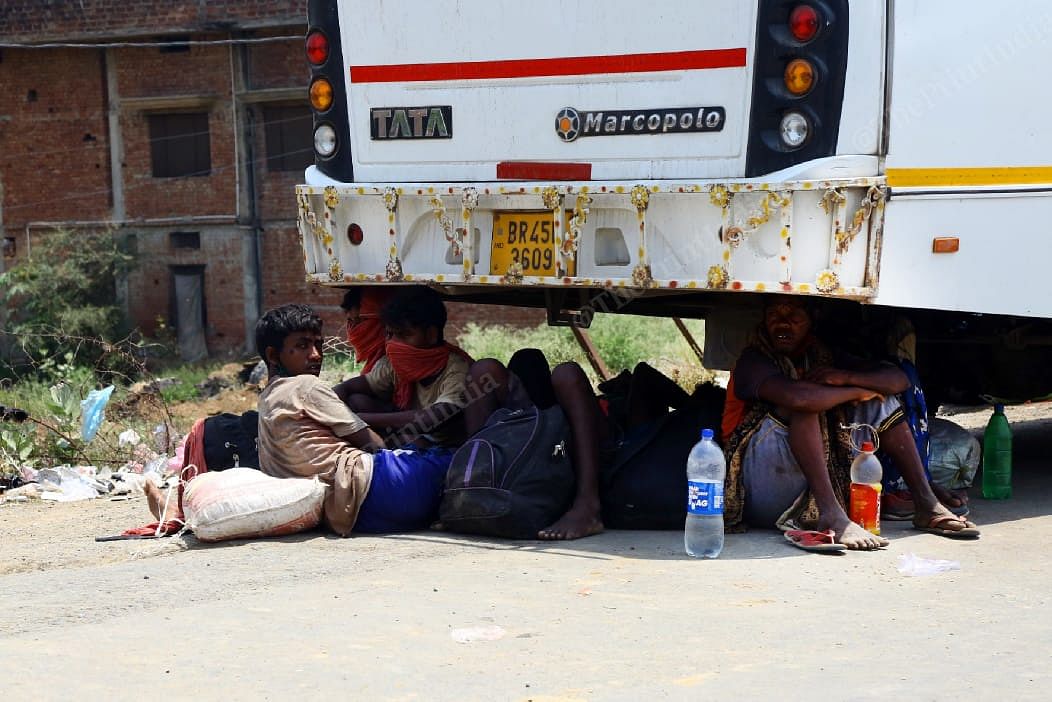
“The government might be claiming that there are sufficient quarantine centres but… that is not true. Also, what about the human resource required to take care of them. We are talking about 27 lakh people for 21 days. It’s going to ruin the economy of Bihar and the state is still not that developed.”
The Bihar government has estimated that there are around 27 lakh migrants who may make their way back to the state, a senior state government official told ThePrint.
“The government has announced that it will facilitate the entry of people to the state and will pay for their transportation. But the state has only looked at short-term measures. If they decide to stay back here for a longer period it will pose a huge challenge to the government,” the official said.
This, the government official added, may force the migrant workers to go back to the cities they are so keen to leave.
“Ultimately, they have to earn their livelihood. And if there won’t be many opportunities in Bihar, people won’t have any option but to go back,” the official said. “It may take time but it’s likely to happen.”
Also Read: How can Modi govt revive economic activity when CMs want migrant workers to return home?
‘Finding it difficult to survive in Delhi’
Problems there may be, but the migrants returning to their home states say they are prepared to fight the battle. Anything to not return to the cities.
Arun Mandal, a Katihar native who used to earn Rs, 7,500 at a company in Allahabad, said he was okay with less money but didn’t want to return. He was part of a group of 10 people who said they had made their way from Allahabad to Bihar, adding that they had tried to hitch a ride on trucks and buses plying on the route, but to no avail.
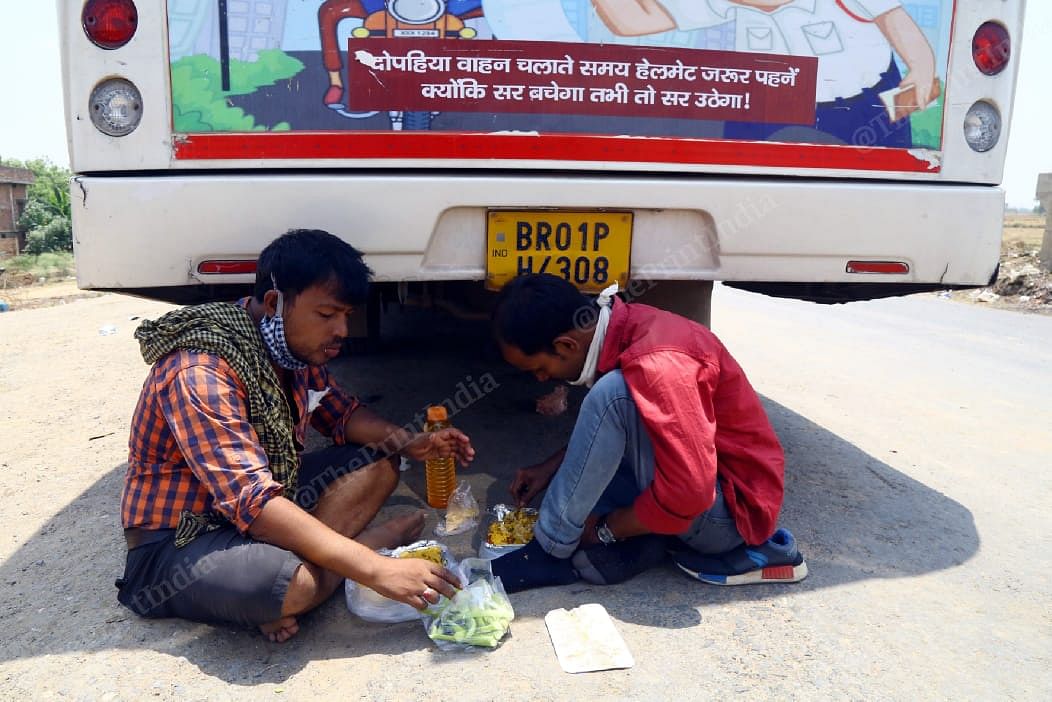
“Police were beating many people, so we escaped through the villages and managed to reach the border. Our home is in Katihar district, which is another 400 kilometres from here (the border),” Mandal said. “The government has not helped at all and now we can’t trust anyone. We will stay and work here even if that means less money.”
Asha, a resident of village Tiloiya Khurd in Hardoi district, Uttar Pradesh, said there “were too many problems in Delhi”.
“I used to work in a utensil factory and came back before the lockdown happened. My husband is also not keeping well and we have to take care of our children,” she added. “We were finding it difficult to survive in Delhi, had to pay rent too, so we decided to come back.”
Also Read: India’s next problem: Convincing frightened workers to return to the cities


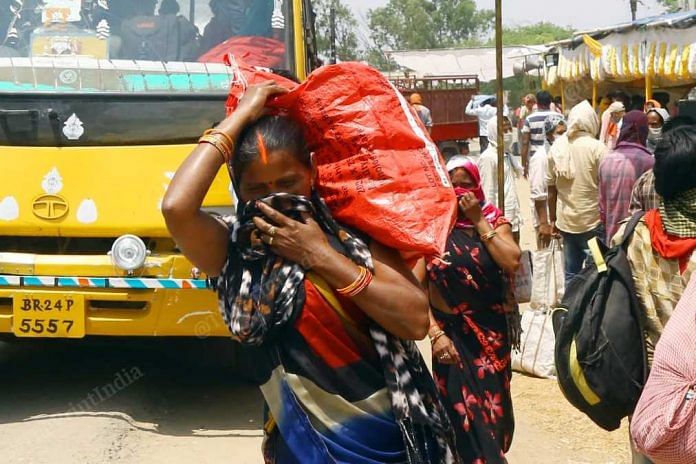

We have decrease the population for future.This is the only way
Haryana to Bihar Jane ke leye
Bihar Jane ke liye train
Mujhe allhabad jana hai please koi help karo nahi to ham bhukhe mar jaenge please help me
how can migrant be treated with respect or compassion were they invited or they thronged.. Migrants do not mention how they donot observe hygiene the surroundings and supplier of petty criminals.. If they have means to stay in villages why they gravitate to city for few re more… New normal would be locate site which are close to labor availability and not close to money bags..
Who’s father’s what ❓Team India mission for peace and love one India one world 125 crs plus wish irrelevant damage has been done we saw the road to all the but with all the measure and bullshitting we could not wipe the real tears at the time we need to most we are like that only, No proof required. We have so much degrees in every field of life to make hay in every crisis. Will not give proof ask yourself. We’re Indian at our best unpredictable and intolerant at our own self what❓ the SECOND we want to help everyone but we help but we have everything but the will also but we have infrastructure in every field of life but we are Indian at our best. Look at Indian Express now to the print the same crisis and PM Fund OH PM care ? We’re missing the good start in every field to a goal less area no where to go. Crisis are our brith right but Top to bottom every one in mode of no return ❓If you you can do this to our own people think? What did they ask basic and they were working for whom that’s person projects as casual/ contractual workers Our policy and politics and beautiful connection say restructuring there CRS but can’t provide the basic and ready to go to jail. We wake up after damage of every crisis we really don’t care for our people. Well👍 too much to say as we are best at story and➕ okay
These poor migrants returning to their own States should have been angry on those political leaders who ruled their States for decades even after which they had to migrate to distant cities to get their two daily roties, not the cities where they went. They should have been angry with Lalu Prasad yadav, Mayavati, Mulayam and Akhilesh Yadav and such people.
““Main toh uss truck waale ka bhi shukr guzar hun jisne Rs 900 mein hum logo ko kaafi aage tak pahucha diya. Jab sarkar khud train ka paisa le rahi hai toh truck waale toh gareeb hain, apna parivar bhi toh chalana hai (I am grateful to the truck driver who helped us cover a long stretch for Rs 900. When the government itself is charging us train fare… truck drivers are poor, need to provide for their families),” he said.’
The Ruling Elite of India, whether in Waste Bengal, Bihar, Rajasthan and elsewhere (I don’t know if Odisha case study can be made an exception) HAS TO DISCARD its role of being a COMRADOR BOURGEOISIE immediately. We have reached a turning point in history and any person, party or Ruler who wishes to rule intelligently in the future, post COVID-19 regime, must be radiating NATIONAL BOURGEOISIE CHARACTERISTICS.
Otherwise we are in for tragic times. Our people citizens at the bottom of pyramid will rise up in arms otherwise IF what is quoted at the commencement of this ‘reply’ of mine is a genuine quote. The People have suffered, are suffering and will continue because of the LACK OF FEELINGS by the rulers. And history has always said this is non negotiable.
Sitting in urban or semi urban settings, it is very easy to align with the government because the government servants are like our relatives, friends, peer groups and role models we have admired. But COVID-19 times are not just managing a virus.It is pandemic times rare in history = when economics is involved. There is no free lunch in economics. Well the migrant workers have given the GoI servants cheap, reliable and unconditional service all these years . Practically free of cost given the fact the their slums i cities lacked common hygiene, their robust health notwithstanding, when they fell ill or had socio-economic problems, they have had to run from hospital to police stations frequently to resolve…..Well it is time now the GoI to return the favor to the Indian People , the common men and women at bottom of pyramid.
How Modi or Mamata create ways and means and the extent to which the other Opposition parties become convincing, will determine our future. We can’t hoodwink the peole of India ALL THE TIME, cann we?
VIVA PRINT FOR THIS GREAT NEWS!
Give a big big slap on the face of those industry owners as well as govt. That will be the best answer !!!
India has not treated these migrants with compassion. A woman, seven months pregnant, walking 500 kilometres from Bombay to Buldana, only her indomitable spirit and God’s grace keeping mother and child safe. The villages offer simply temporary reprieve and a lower cost of living and survival. Sooner or later, these migrants will have to take trains back to the big cities that can value their labour more fairly. Yogiji aur Nitishbabu se kya barqat milne wali hai.
This reverse migration is very good and very necessary. This will deconjest the cities. Now there will be no shortage of labour in the villages and agriculture. This is an opportunity to develop the villages, agriculture and rural economy. The government should not open any new office, industry in the cities, state capitals and district headquarters. Now all the new industries and offices should be opened in the villages and towns.
Indians need to stop making babies. Period. At the rate at which Indians procreate, even God cannot create jobs and prosperity. So stop producing children and live a rich, happy and stress free life.
Are we missing a point in regard to migrant labour. The exodus for work is largely from the five big central Indian states – Bihar, UP, MP, Orissa and W. Bengal) – lately from Assam as well. Why is it so even after 70 years of Independence? India needs to reflect.
This is the final result of our sins of neglecting development. We couldn’t provide them basic safe housing, or even ensure that the financial aid reached on time. If we hadn’t encouraged informal nature of our economy, brought these poor migrants under some formal safety net, all this wouldn’t have happened. Sad. Atleast now we should have a massive formalisation drive where in all these migrants and even roadside vendors are accounted for in some database to help them during crises. Daunting, but given our problems, we hardly have a choice. We already have a base ready with JAM Trinity. States and centre need to build aggressively housing facilities of some decent kind. There’s no reason why so many poor people should live in conditions like those in Dharavi. Would give a fillip to the sinking real estate and construction sector with multiplier effect.